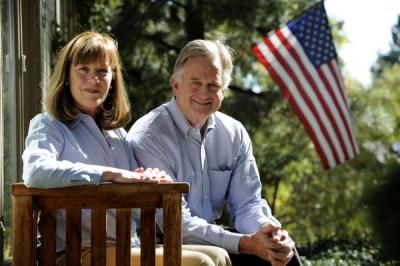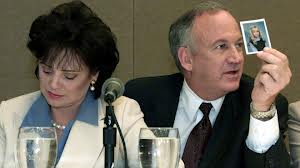Posts tagged Boulder

WBB: Buffs hang tough until final minute, lose by 2
Jan 26th
BOULDER – Colorado stayed with No. 14 Arizona State for the better part of 40 minutes Sunday at the Coors Events Center. Unfortunately for the Buffaloes, the final half minute was no time to come undone.
Getting a pair of free throws from Adrienne Thomas with 4.4 seconds to play, the Sun Devils edged the Buffs 68-66. CU (12-7, 2-6) had hoped to sweep the Pac-12 Conference’s desert entries after a 68-47 win against Arizona on Friday night that broke a four-game Buffs losing streak.
But it wasn’t to be against the opportunistic Sun Devils (17-3, 6-2).
With the score tied at 66-66, CU coach Linda Lappe called timeout with 21 seconds to play to set her final strategy. It didn’t go as planned; Brittany Wilson lost her dribble, ASU got the loose ball and Thomas was fouled with 4.4 seconds to play.
After Thomas hit both free throws, Wilson lost the ball coming up court, recovered, but could manage only a three-quarter court heave that only added to CU’s afternoon of frustration.
Of CU’s 12 turnovers, none were more costly than the final two. Said Wilson of the miscue coming out of the timeout: “I felt I got tripped, it was a no call. . . nothing much more to say.”
Added Lappe: “Just about everything bad that could have happened did at the end of the game . . . we have to learn how to finish. We’ve got to get a shot off, no matter what happens. (The officials) were calling fouls (23 on each team); we can’t make excuses.”
Lappe declined comment on Wilson’s alleged un-called trip: “I’m not going to comment on that . . . bottom line, we have to make plays.”
Jen Reese, who matched her career high with 22 points for a second straight game, said she believed the Buffs were focused coming of their timeout when the score was tied at 66. “But we should have gotten a shot up,” she added. “We didn’t finish . . . they were fouled and hit their free throws.”
Aiding Reese in the scoring column were Brittany and Ashley Wilson with 12 points each and Jamee Swan with 10. Deja Mann scored a team-high 17 points and was one of three Sun Devils in double figures, and ASU got 25 points from its bench.
CU outrebounded ASU 42-35 and hit 20-of-23 free throws – including 11-of-11 in the first half. Lappe said those two numbers were among positives to be taken away from the loss, the others being a “toughness level” that is becoming what she wants, overall execution in the final 8 minutes, and her team’s turnover total (10) before the final minute.
“We’re obviously disappointed,” Lappe said. “ASU is tough, well-coached. They find ways to win games this year; they make plays down the stretch. Give them credit, they’ve done this to a lot of teams. Tonight we were the victim.”
ASU led by 10 points in the first half before CU regained its shooting touch and made the afternoon competitive in the second half. The Buffs hit six of their first eight shots, took a 12-9 lead – their largest of the half – then went mountain stream cold.
From the 15:05 mark until 7:23 before intermission, they dropped from 75 percent shooting to 35 percent – going one for 12 and watching the Sun Devils launch a 12-0 run. That surge enabled ASU to take a double-digit lead – 24-14 –and appear to be in control.
But CU wasn’t ready to roll. If their shooting touches from the field occasionally went icy, it was a different story at the free throw line. For only the second time this season, the Buffs were perfect at the foul line, hitting all of 11 of their attempts – which kept them in the game. By halftime their field goal percentage was a humbling 30.3 (10-of-33), while the Sun Devils checked in at 42.9 percent (12-of-28). CU finished the afternoon shooting 38.3 percent from the field, ASU 41.5.
Free throw perfection in the first half’s final 5 minutes – all of CU’s fouls shots came in that span – kept the Buffs within three points (34-31) at intermission. Yet to catch and pass ASU in the second half, CU couldn’t count on doing it with free throws – their shooting had to improve, and the opening 4 minutes of the second half showed signs of that happening.
After Mann scored consecutive baskets to open the scoring and push ASU ahead 38-31, Reese – her nine field goals were a career high – hit a put-back to open a 6-0 run that pulled the Buffs to within 38-37. It was the closest CU had been since 13-12.
The Buffs got their first lead since 12-11 on a layup by Roberson that sent them up 39-38 with 15:16 remaining. CU matched its largest lead to that point – three points at 43-40 – on back-to-back baskets by Reese.
But Promise Amukamara matched Reese’s two buckets, giving ASU a 44-43 advantage and promising a back-and-forth final 10 minutes – if the Buffs didn’t encounter another Ice Age. They didn’t, and even a five-point ASU lead (52-47) didn’t deter them.
The Buffs lost their perfection from the foul line when Ashley Wilson finally missed the first of two with 8:58 to play. But “A-Wil” hit the second attempt, followed with two more on the next possession and tied the score at 52-52.
Neither team led by more than two points over the final 8 minutes, with CU taking a two-point advantage (66-64) on a three-point play by Ashley Wilson with 2:51 left.
With the Buffs leading 66-65, Reese missed a foul line jumper with 45 seconds left and ASU coach Charli Turner Thorne called a time out with 41.9 seconds to play. Fouled by Brittany Wilson on a loose ball battle, Kelsey Moos hit one of two free throws to tie the score at 66-66 at the 28.5-second mark.
Reese controlled the rebound on Moos’ miss and it was CU’s turn for a timeout to set its final strategy in the last 21.1 seconds. If both of the Buffs’ final possessions went bust, the Sun Devils have been there and conquered that.
“A majority of our games have come down to one possession,” Turner Thorne said. “We have a lot of experience in these situations. This team has a lot of confidence, and because of that, we’ve been able to out on top of every single one of these close games.”
The Buffs travel to Utah on Wednesday night (7 p.m.) before returning to the CEC to face the Utes again on Sunday, Feb. 2 (noon).
WAHL HONORED: CU’s first women’s athletic director, Jane Wahl, received the inaugural Jane Wahl Legacy Award Sunday, at both a pregame reunion luncheon with dozens of former players in attendance and again at halftime. The award will be presented annually to a member of the women’s basketball community who through their achievements brings honor and recognition to the program.
Wahl accepted the award from Ceal Barry, CU’s associate athletic director for student services and former women’s basketball coach. Barry noted that the first decade of women’s athletics set the table for future success, and in the case of basketball, began several traditions, including making the Coors Events Center the tough place it has become for opponents to play.
“I view this like a relay race,” Wahl said. “I worked the first leg and then handed the baton to others who went on to bring women’s athletics at CU to where it is today. The work I did at CU was some of the most meaningful of my life. To help create opportunities for women to participate in varsity athletics that didn’t exist before 1974. It was rewarding to do work that empowered women, life-changing work that served them well for the rest of their lives.”

Mark Beckner: Fleet White not involved in JonBenets Murder…..mmm—kay
Jan 25th
For the third time in 15 years Boulder Police have repeatedly said Fleet White was not involved in JonBenets murder. Why do they keep bringing up Fleet White then ?? And why now ? Why after reporter Charlie Brennan got the DA to release the Grand Jury findings which say John and Patsy Ramsey did it ?? White was in the house the day of the murder, but why do the police keep going back to him ?? Are they setting a trap?? And for whom? Jon Ramsey ? These are the actions of a trap setter. Why are the police bringing this case back to life by retelling the whole saga of Fleet White and John Ramsey ??
The Saga is in short John Ramsey and Fleet white were best friends. They entertained together. JonBenet was friends with Whites daughter. White was with John Ramsey when he found JonBenets Body. But when John Ramsey and his wife Patsy went to Atlanta and went on CNN to claim their innocence… white and Ramsey had a huge falling out. Some say almost deadly and there were reports of a fight over a handgun on a couch. White became a prime witness for the prosecution but in the meanwhile a California woman came forward and claimed white and his father had abused her. The tabloids and and some attorneys got a hold of the story and it blew up into a tawdry scandal. This case and story was laced with inappropriate sexuality concerning children and the pageant industry.
Fleet White again wants the police to clear his name. Fine. But, Until John Ramsey is arrested and convicted by Boulder Police , DA and Boulder Jury there will be no peace for anyone involved. The Ghost of JonBenet can be heard still to this day, screaming in the Boulder midnight January howling winds ” mommy why did you kill me??” listen carefully at night Boulder, you can hear here little voice.
FROM BOULDER POLICE
To correct past inaccurate statements and speculation appearing in the media, and at the request of Fleet and Priscilla White, the Boulder Police Department releases the following statement:
Since December 26, 1996, the homicide of JonBenet Ramsey has been the subject of widespread news reports and speculation by the media. A great deal of that reporting and speculation targeted innocent community members whose only connection to the crime was as cooperating witnesses. This includes the Fleet White, Jr. family of Boulder who suffered embarrassment and damage to their reputations. The Boulder Police Department recognizes the suffering the Whites have endured as a result of the accusations made against the White family during the course of the investigation.
The Boulder Police Department investigators have always considered the White family to only be witnesses in this case. The Boulder Police Department has never considered the White family to be suspects in the case. In 2000, the police department did investigate allegations made by a California woman to District Attorney Alex Hunter, as reported in the press, that were intended to cast suspicion on the White family. The department found no evidence to support the unfounded allegations. There has never been any evidence to link the White family to the JonBenet Ramsey homicide.
We wish to express our gratitude for the White family’s cooperation and contributions in regard to the investigation of JonBenet’s death.
Mark R. Beckner
Chief of Police

Scammers failing in Xcel ruse, so far
Jan 25th
Boulder police have received three complaints from local business owners who say scammers pretending to be Xcel Energy employees have targeted their businesses.
The complainants have shared similar stories with investigators that begin with a phone call claiming that the customer’s utility account is past due and is about to be disconnected within the next few hours. The victims are then told to pay the bill immediately via a wire service like Western Union or a prepaid debit card like MoneyPak. In one case, the phone scammer wanted to meet the potential victim to get the money in person.
The three businesses which were targeted received calls on Jan. 15, Jan. 17, and Jan. 20. In each case, the victims contacted police and Xcel to check that their accounts were in good standing.
So far, no one has fallen for the scheme and Boulder police would like to make sure that area residents and business owners are aware of the scam.
People should be wary of giving personal information like bank account numbers or social security numbers over the phone. It’s also a red flag if telemarketers use high-pressure tactics such as saying “you must pay now or lose your service.”
Anyone who has questions about their Xcel account may contact Xcel’s customer service center at 800-895-4999, or customerservice@xcelenergy.com.
Anyone who believes they may have been the victim of a phone scam may report it to the Boulder Police Department at 303-441-3333.





























